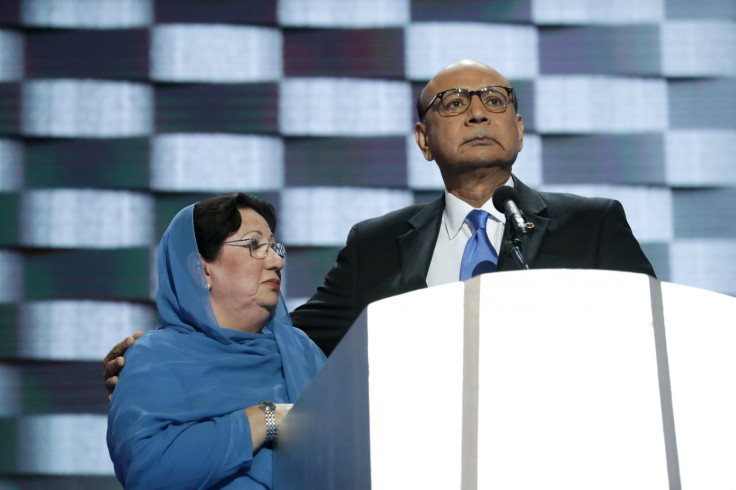Trump's response to the Khans depicted them as vicious, irrational attackers
Republican candidate treats all Muslims as enemies rather than people.

A fascinating drama has played out since Khizr and Ghazala Khan appeared at the Democratic National Convention on Thursday (28 July). On that date, the bereaved parents of a son who died serving in the United States Army have stood before a national audience and asked to be recognised as American patriots by Republican presidential nominee Donald Trump. He has refused.
Most news stories have focused on Khizr Khan holding up the constitution or on his challenge to Trump to demonstrate that he too has made sacrifices for the nation. But these more sensational aspects of the story distract us from the essential problem of human dignity that is at the heart of the drama.
Both the asking for recognition and Trump's refusal deserve our critical attention. First, at the Democratic National Convention, Khizr Khan said: "Tonight we are honoured to stand here as parents of Captain Khan and as patriotic American Muslims. With undivided loyalty to our country."
Khan described his family as loyal and patriotic American Muslims, in stark contrast to Trump's call last December for "a total and complete shutdown of Muslims entering the United States," which, as I have previously written, treated all Muslims as radical Jihadists, filled with incomprehensible hatred toward the US – as irrational enemy objects, rather than as people. Trump's statements since have continued to treat all Muslims as irrational enemies, rather than Americans.
It was against this backdrop that Khan demanded Trump recognise that his son had made the ultimate sacrifice and is therefore the counter example to Trump's categorisation of Muslims: "If it was up to Donald Trump, [our son] never would have been in America. Donald Trump consistently smears the character of Muslims" said Khan in his speech.
The convention hall received Khan's message well, standing and cheering, tears welling up in many delegates' eyes. On social media, praise for Khan threatened to overshadow even Hillary Clinton's historic acceptance speech and news reports called the speech "powerful" and "effective" while sales of pocket copies of the US Constitution spiked.
The power of parrhesia
Khan spoke fearlessly, despite the power difference between himself and Donald Trump, practising what the ancient Greeks called 'parrhesia'. A speaker uses parrhesia when he or she speaks truth to power, believing themselves duty-bound to do so despite the risks. As a Muslim American unused to the political spotlight Khan drew attention to his family in a way that may not be universally popular, yet he spoke his truth in defiance of the potential dangers involved.
In response, two days later, Trump appeared on ABC News and questioned Khizr Khan's authenticity – questioned his voice – by asking "Who wrote that? Did Hillary's scriptwriters write it?" Trump questioned whether or not Khan's words were authentically his own, questioning his ability to tell the "truth" to power and denying him the possibility of using parrhesia.
In the same interview Trump criticised Ghazala for remaining silent: "If you look at his wife, she was standing there. She had nothing to say. She probably, maybe she wasn't allowed to have anything to say. You tell me, but plenty of people have written that she was extremely quiet, and it looked like she had nothing to say," he said.
Khizr spoke someone else's words and Ghazala spoke not at all – neither of them could be authentic truth tellers, neither could be the loyal and patriotic American Muslims they claimed to be.
On Sunday (31 July), Trump attempted to tweet an apologia – a speech of self-defence – when he argued, "I was viciously attacked by Mr Khan at the Democratic Convention. Am I not allowed to respond? Hillary voted for the Iraq War, not me!"
Khan's speech at the DNC was not truth telling, but a vicious attack. Khan therefore could not be a loyal and patriotic American Muslim, as he claimed, but rather – as Trump has argued all Muslims are – an irrational aggressor. Trump also used the typical blame-shifting technique of "bolstering" by attempting to identify himself with the good judgement of those who were against the Iraq War while simultaneously attacking Hillary Clinton.
The next day, Trump again painted Khizr Khan as an irrational and vicious attacker when he tweeted: "Mr. Khan, who does not know me, viciously attacked me from the stage of the DNC and is now all over TV doing the same – Nice!"
Essentially, Khizr and Ghazala Khan have asked Donald Trump to recognise their humanity and he has refused. They have asked him to recognise them as truth tellers and he has refused. They have asked him to recognise them as loyal and patriotic American Muslims and he has refused.
On Monday (1 August), Khizr and Ghazala Khan appeared on CNN to respond to Trump's apologia: "We are a testament to the goodness of this country."
Dr Jennifer Mercieca is associate professor at the Department of Communication, Texas A&M University
© Copyright IBTimes 2025. All rights reserved.






















